- Home
- Sue Grafton
A is for ALIBI Page 8
A is for ALIBI Read online
Page 8
Apartment #1 was on my left. When I rang the bell, it sounded like the br-r-r-r of an alarm clock running down. The door was opened by a woman with a row of pins in her mouth that bobbed up and down when she spoke. I worried she would swallow one.
“Yes?”
“Mrs. Glass?”
“That’s right.”
“My name is Kinsey Millhone. I’m a private investigator. I work up in Santa Teresa. Could I talk to you?”
She took the pins out of her mouth one by one and stuck them into a pin cushion that she wore on her wrist like a bristling corsage. I handed her my identification and she studied it with care, turning it over as though there might be tricky messages written in fine print on the back. While she did that, I studied her. She was in her early fifties. Her silky brown hair was cut short, a careless style with strands anchored behind her ears. Brown eyes, no makeup, bare-legged. She wore a wraparound denim skirt, a washed-out Madras blouse in bleeding shades of blue, and the kind of cotton slippers I’ve seen in cellophane packs in grocery stores.
“It’s about Elizabeth,” she said, finally returning my I.D.
“Yes. It is.”
She hesitated and then moved back into the living room, making way for me. I picked my way across the living-room floor and took the one chair that wasn’t covered with lengths of fabric or patterns. The ironing board was set up near the bay window, the iron plugged in a ticking as it heated. There were finished garments hanging on a rack near the sewing machine on the far wall. The air smelled of fabric sizing and hot metal.
In the archway to the dining room, a heavyset man in his sixties sat in a wheelchair, his expression blank, his pants undone in front, heavy paunch protruding. She crossed the room and turned his chair around so that it faced the television set. She put headphones on him and then plugged the jack into the TV, which she flipped on. He watched a game show whether he liked it or not. A couple were dressed up like a boy and girl chicken but I couldn’t tell if they were winning anything.
“I’m Grace,” she said. “That’s her father. He was in an automobile accident three years ago last spring. He doesn’t talk but he can hear and any mention of Elizabeth upsets him. Help yourself to coffee if you like.”
There was a ceramic percolator on the coffee table, plugged into an extension cord that ran back under the couch. It looked as if all the other appliances in the room were radiating from the same power source. Grace eased down onto her knees. She had about four yards of dark green silk spread out on the hardwood floor and she was pinning a handmade pattern into place. She held a magazine out to me, opened to a page that showed a designer dress with a deep slit up one side and narrow sleeves. I poured myself a cup of coffee and watched her work.
“I’m running this up for a woman married to a television star,” she said mildly. “Somebody’s sidekick. He got famous overnight and she says he’s recognized even in the car wash now. People asking for his autograph. Has facials. Him, not her. He was poor, I hear, for the last fifteen years and now they go to all these parties in Bel Air. I do her clothes. He buys his on Rodeo Drive. She could, too, on the money he makes but it makes her feel insecure, she says. She’s much nicer than he is. I already read in the Hollywood Reporter, ‘New Two You,’ him and somebody else ‘pulling up steaks at Stellini’s.’ She’d be smart to put an expensive wardrobe together before he leaves her if you ask me.”
Grace seemed to be talking to herself, her tone distracted, a smile warming her face now and then. She picked up a pair of pinking shears and began to cut along the straight edge, the scissors making a crunching sound against the wood floor. For a while I didn’t say anything. There was something hypnotic about the work and there seemed to be no compulsion to converse. The television flickered, and from an angle I could see the girl chicken jumping up and down, hands to her face. I knew the audience was urging her to do something ��� choose, pass, change boxes, take what was behind the curtain, give back the envelope, all of it taking place in silence while Libby’s father looked on from his wheelchair incuriously. I thought she should consult her boy-chicken mate but he just stood there selfconsciously like a kid who knew he was too old to be out in costume on Halloween. The tissue-paper pattern rustled as Grace removed it, folding it carefully before she laid it aside.
“I sewed for Elizabeth when she was young,” she said. “Once she left home, of course, she only wanted store-bought. Sixty dollars for a skirt that only had twelve dollars’ worth of wool at most, but she did have a good eye for color and she could afford to do as she pleased. Would you like to see a picture of her?” Grace’s eyes strayed up to mine and her smile was wistful.
“Yes. I’d appreciate that.”
She took the silk first and placed it on the ironing board, testing the iron with a wet index finger as she passed. The iron spat back and she turned the lever down to “wool.” There were two snapshots of Libby in a double frame on the windowsill and she studied them herself before she handed them to me. In one, Libby was facing the camera but her head was bent, her right hand upraised as though she were hiding her face. Her blonde hair was sun-streaked, cut short like her mother’s but feathered back across her ears. Her blue eyes were amused, her grin wide, embarrassed to be caught, I couldn’t think why. I’d never seen a twenty-four-year-old look quite so young or quite so fresh. In the second snapshot, the smile was only partially formed, lips parted over a flash of white teeth, a dimple showing near the comer of her mouth. Her complexion was clear, tinted with gold, lashes dark so that her eyes were delicately outlined.
“She’s lovely,” I said. “Really.”
Grace was standing at the ironing board, touching up folds of silk with the tip of the iron, which sailed across the asbestos board like a boat on a flat sea of dark green. She turned the iron off and wiped her hands briefly down along her skirt, then took the pieces of silk and began to pin them together.
“I named her after Queen Elizabeth,” she said and then she laughed shyly. “She was born on November 14, the same day Prince Charles was born. I’d have named her Charles if she’d been a boy. Raymond thought it was silly but I didn’t care.”
“You never called her Libby?”
“Oh no. She did that herself in grade school. She always had such a sense of who she was and how her life should be. Even as a child. She was very tidy ��� not prissy, but neat. She would line her dresser drawers with pretty floral wrapping papers and everything would be arranged just so. She liked accounting for the same reason. Mathematics was orderly and if made sense. The answers were always there if you worked carefully enough, or that’s what she said.” Grace moved over to the rocking chair and sat down, laying the silk across her lap. She began to baste darts.
“I understand she worked as an accountant for Haycraft and McNiece. How long was she there?”
“About a year and a half. She had done the accounts for her father’s company ��� he did small-appliance repair ��� but it really didn’t interest her, working for him. She was ambitious. She passed her CPA exam when she was twenty-two. She took a couple of computer courses, too, in night school, after that. She made very good grades. She had two junior accountants working under her, you know.”
“Was she happy there?”
“I’m sure she was,” Grace said. “She spoke of going to law school at one point. She enjoyed business management and finance. She liked working with figures and I know she was impressed because that company represented very wealthy people. She said you could learn a lot about someone’s character by the way they spent money, what they bought and where ��� whether they lived within their means, that kind of thing. She said it was a study of human nature.” Grace’s voice. was tinged with pride. It was hard for me to reconcile the idea of this prim-sounding CPA with the girl in the photographs who looked pretty, animated, bashful, and rather sweet, hardly a woman with a hard-driving purpose in life.
“What about her old boyfriend? Do you have any idea where he
is now?”
“Who, Lyle? Oh, he’ll be around in a bit.”
“Here?”
“Oh my, yes. He stops by every day at noon to help me with Raymond. He’s a lovely boy but of course you probably knew she broke off her engagement with him a few months before… she passed on. She went with Lyle all through high school and they both attended Santa Monica City College together until he dropped out.”
“Is that when he went to work for Wonder Bread?”
“Oh no, Lyle’s had many jobs. At the time Lyle left school, Elizabeth was in her own apartment and she didn’t confide much in me but I feel she was disappointed in him. He was going to be a lawyer and then he simply changed his mind. He said law was too dull and he didn’t like details.
“Did they live together?”
Grace’s cheeks tinted slightly. “No, they didn’t. It may sound odd and Raymond thought it was very wrong of me, but I encouraged them to move in together. I sensed that they were drifting apart and I thought it would help. Raymond was like Elizabeth, disenchanted with Lyle for quitting school. He told her she could do much better for herself. But Lyle adored her. I thought that should count for something. He would have found himself. He had a restless nature, like many boys that age. He would have come to his senses and I told her so. He needed responsibility. She could have been a very good influence because she was so responsible herself. But Elizabeth said she didn’t want to live with him and that was that. She was strong willed when she wanted to be. And I don’t mean that as criticism. She was as nearly perfect as a daughter could be. Naturally I wanted whatever she wanted but I couldn’t bear to see Lyle hurt. He’s very dear. You’ll see when you meet him.”
“And you have no idea what actually caused the breakup between them? I mean, could she possibly have been involved with someone else?”
“You’re talking about that attorney up in Santa Teresa,” she said.
“It’s his death I’m looking into,” I said. “Did she ever talk to you about him?”
“I never knew anything about him until the police came down from Santa Teresa to talk to us. Elizabeth didn’t like to confide her personal affairs, but I don’t believe Elizabeth would fall in love with a married man,” Grace said. She began to fuss with the silk, her manner agitated. She closed her eyes and then pressed a hand to her forehead as though checking to see if she’d contracted a sudden fever. “I’m sorry. Sometimes I forget. Sometimes I pretend she got sick. The other makes me cringe, that someone might have done that to her, that someone could have hated her that much. The police here don’t do anything. It isn’t solved but no one cares anymore so I just… I simply tell myself she got sick and was taken. How could someone have done that to her?” Her eyes welled with tears. Her grief rolled across the space between us like a wash of salt water and I could feel tears form in my own eyes in response. I reached out and took her hand. For a moment, she clutched my fingers hard and then she seemed to catch herself, pulling back.
“It’s been like a weight pressing on my heart. I will never recover from it. Never.”
I phrased my next question with care. “Could it have been an accident?” I said. “The other man ��� Laurence Fife ��� died from oleander, which someone put in an allergy capsule. Suppose they’d been doing business together, going over accounts or something. Maybe she was sneezing or complaining about a stuffy nose and he just volunteered his own medication. People do that all the time.”
She considered that for a moment uneasily. “I thought the police said the attorney died before she did. Days before.”
“Maybe she didn’t take the pill right away,” I said, shrugging. “With something like that, you never know when someone will take a doctored capsule. Maybe she put it in her purse and swallowed it later without even realizing there was any jeopardy. Did she have allergies? Could she have been coming down with a cold?”
Grace began to weep, a small mewing sound. “I don’t remember. I don’t think so. She didn’t have hay fever or anything like that. I don’t even know who’d remember after all these years.”
Grace looked at me then with those large, dark eyes. She had a good face, almost childlike, with a small nose, a sweet mouth. She took out a Kleenex and wiped her cheeks. “I don’t think I can talk about it anymore. Stay for lunch. Meet Lyle. Maybe he can tell you something that would help.”
Chapter 10
*
I sat on a stool in the kitchen and watched Grace make tuna fish salad for lunch. She had seemed to shake herself, as though wakening from a brief but vital nap and then she had put on her apron and cleared the dining-room table of the rest of her sewing paraphernalia. She was a woman who worked with care, her movements restful as she assembled placemats and napkins. I set the table for her, feeling like a well-behaved kid again while she rinsed lettuce and patted it dry, placing a layer on each plate like a doilie. She neatly pared thin ribbons of skin from several tomatoes and coiled them like roses. She fluted a mushroom for each plate, added two thin spikes of asparagus so that the whole of it looked like a flower arrangement. She smiled at me timidly, taking pleasure in the picture she had created. “Do you cook?”
I shook my head.
“I don’t have much occasion to myself except when Lyle’s here. Raymond wouldn’t notice and I probably wouldn’t bother at all if it were just for me.” She lifted her head. “There.”
I hadn’t heard the truck pull into the driveway but she must have been tuned to Lyle’s arrival. Her hand strayed unconsciously to a strand of hair, which she tucked back. He came in through a utility room off to the left, pausing around the comer, apparently to take off his boots. I heard two thunks. “Hey, babe. What’s for lunch?”
He came around into the dining room with a grin, giving her cheek a noisy buss before he caught sight of me. He halted, the animation flickering off and on, then draining out of his face. He looked at her hesitantly.
“This is Miss Millhone,” she said to him.
“Kinsey,” I filled in, holding out my hand. He reached out and shook my hand automatically, but the central question still hadn’t been answered. I suspected that I was intruding on an occasion that ordinarily admitted no variation. “I’m a private investigator from Santa Teresa,” I said.
Lyle moved over to Raymond without another glance at me.
“Hey, Pops. How’s it going today? You feeling okay?”
The old man’s face registered nothing, but his eyes came into focus. Lyle took the headphones off, turning the set off too. The change in Lyle had been immediate and I felt as if I’d just seen snapshots of two different personalities in the same body, one joyful, the other keeping watch. He was not much taller than me and his body was trim, his shoulders wide. He had his shirt pulled out, unbuttoned down the front. His chest muscles were spare but well formed like those of a man who’s been lifting weights. I guessed him to be about my own age. His hair was blond, worn long and faintly tinted with the green of a chlorinated swimming pool and hot sun. His eyes were a washed-out blue, too pale for his tan, his lashes bleached, his chin too narrow for the breadth of his cheeks. The overall effect was of a face oddly off-good looks gone slightly askew, as though under the surface there were a hairline crack. Some subterranean tremor had caused the bones to shift minutely and the two halves of his face seemed not quite to match. He wore faded jeans slung low on his hips and I could see the silky line of darkish hair pointing like an arrow toward his crotch.
He went about his business, ignoring me completely, talking to Grace while he worked. She handed him a towel, which he tucked under Raymond’s chin, and then he proceeded to lather and shave him with a safety razor, which he rinsed in a stainless-steel bowl. Grace was taking out bottles of beer, removing the caps, pouring liquid into tulip glasses which she set at each place. There was no plate prepared for Raymond at all. When the shaving process had been completed, Lyle brushed Raymond’s thinning white hair and then fed him a jar of baby food. Grace shot me a satisfie
d look. See what a dear he is? Lyle reminded me of an older brother caring for a toddler so that Mom would approve. She did. She looked on affectionately while Lyle scraped Raymond’s chin with the bowl of the spoon, easing the drooling vegetable puree back into Raymond’s slack mouth. Even as I watched, a stain began to spread across the front of Raymond’s pants.
“Hey, don’t worry about it, Pops,” Lyle crooned, “we’ll get you cleaned up after lunch. How’s that?”
I could feel the muscles in my face setting with distaste.
During lunch, Lyle ate quickly, saying nothing to me and very little to Grace.
“What sort of work do you do, Lyle?” I said.
“Lay brick.”
I looked at his hands. His fingers were long and dusted with mortar gray that had seeped down into the crevices of his skin. At this range, I could smell sweat, overlaid with the delicate scent of dope. I wondered if Grace noticed at all or if, perhaps, she thought it might be some exotic aftershave.
“I’ve got to make a run up to Vegas,” I said to Grace, “but I’d like to stop back on my way up to Santa Teresa. Do you have any of Libby’s belongings?” I was relatively certain she did.

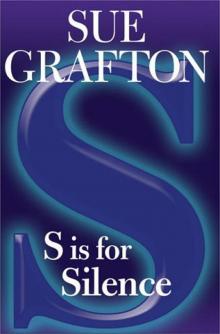 S Is for Silence
S Is for Silence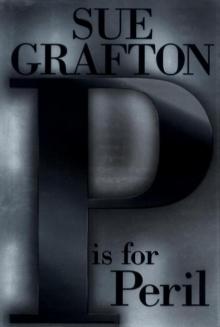 P Is for Peril
P Is for Peril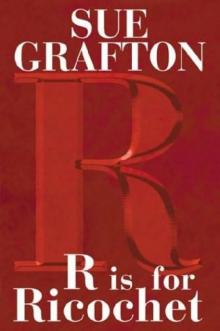 R Is for Ricochet
R Is for Ricochet J Is for Judgment
J Is for Judgment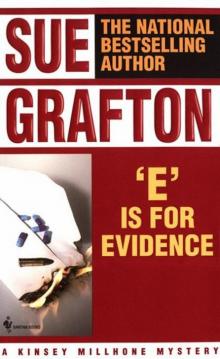 E Is for Evidence
E Is for Evidence T Is for Trespass
T Is for Trespass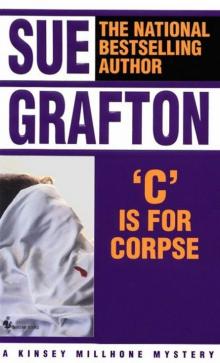 C Is for Corpse
C Is for Corpse U Is for Undertow
U Is for Undertow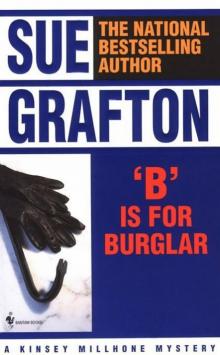 B Is for Burglar
B Is for Burglar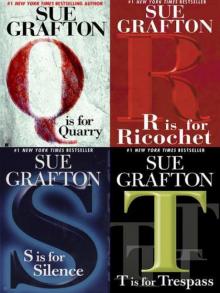 Four Sue Grafton Novels
Four Sue Grafton Novels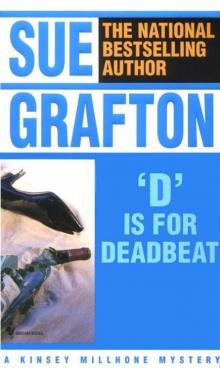 D Is for Deadbeat
D Is for Deadbeat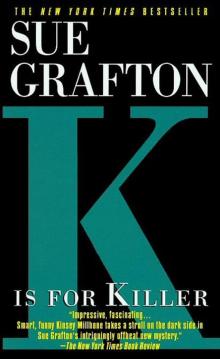 K Is for Killer
K Is for Killer I Is for Innocent
I Is for Innocent A Is for Alibi
A Is for Alibi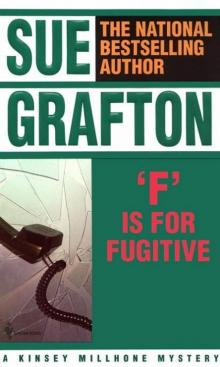 F Is for Fugitive
F Is for Fugitive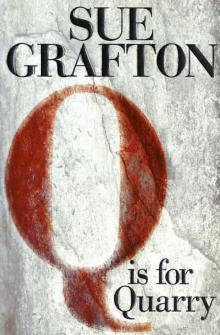 Q Is for Quarry
Q Is for Quarry W Is for Wasted
W Is for Wasted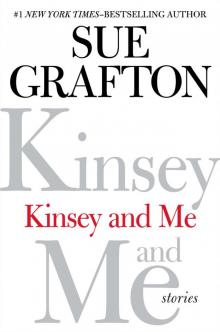 Kinsey and Me: Stories
Kinsey and Me: Stories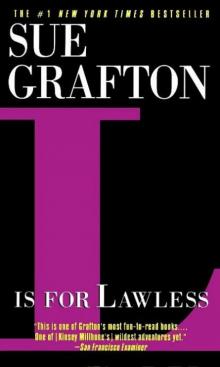 L Is for Lawless
L Is for Lawless Y Is for Yesterday
Y Is for Yesterday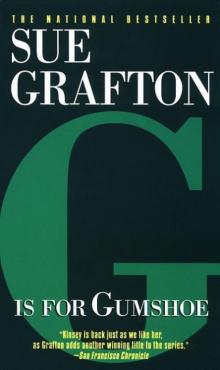 G Is for Gumshoe
G Is for Gumshoe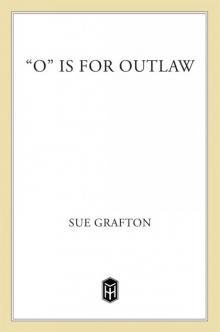 O Is for Outlaw
O Is for Outlaw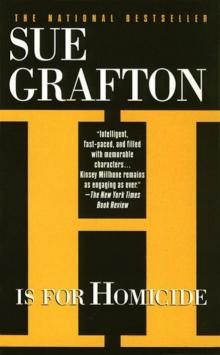 H Is for Homicide
H Is for Homicide X
X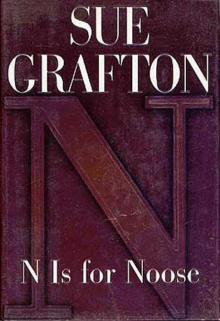 N Is for Noose
N Is for Noose Three Complete Novels: A Is for Alibi / B Is for Burglar / C Is for Corpse
Three Complete Novels: A Is for Alibi / B Is for Burglar / C Is for Corpse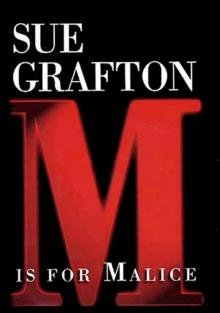 M Is for Malice
M Is for Malice I is for INNOCENT
I is for INNOCENT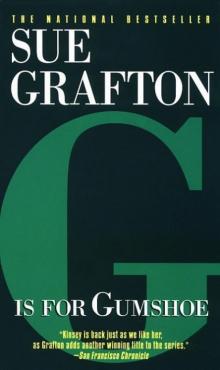 G is for GUMSHOE
G is for GUMSHOE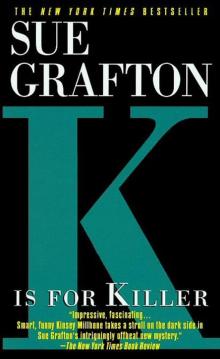 K is for KILLER
K is for KILLER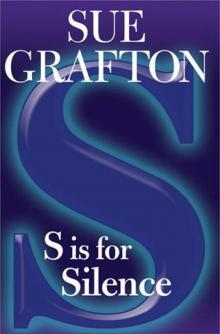 S is for SILENCE
S is for SILENCE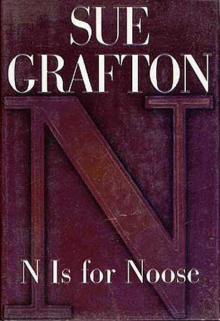 N is for NOOSE
N is for NOOSE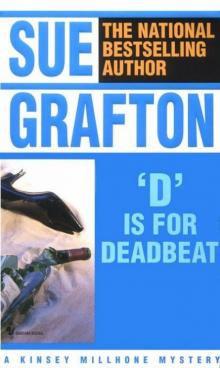 D is for DEADBEAT
D is for DEADBEAT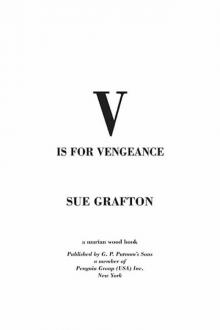 V is for Vengeance
V is for Vengeance U is for Undertow
U is for Undertow W Is for Wasted km-23
W Is for Wasted km-23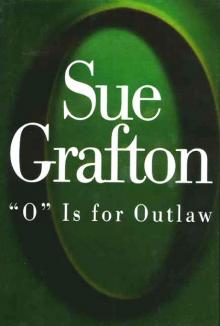 O is for OUTLAW
O is for OUTLAW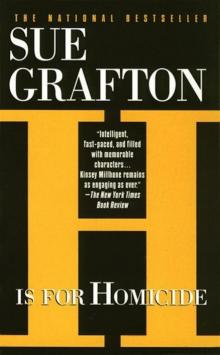 H is for HOMICIDE
H is for HOMICIDE Sue Grafton Novel Collection
Sue Grafton Novel Collection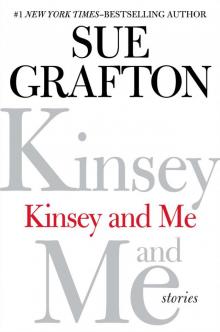 Kinsey and Me
Kinsey and Me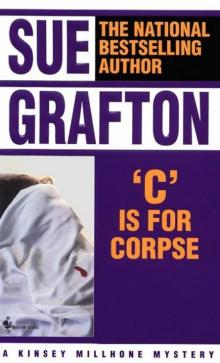 C is for CORPSE
C is for CORPSE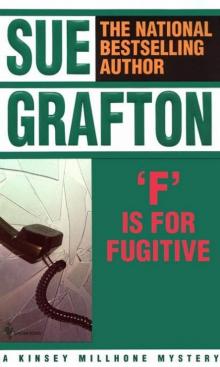 F is for FUGITIVE
F is for FUGITIVE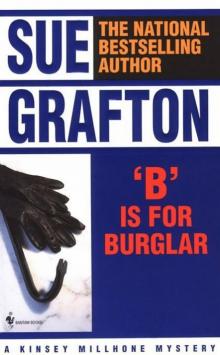 B is for BURGLAR
B is for BURGLAR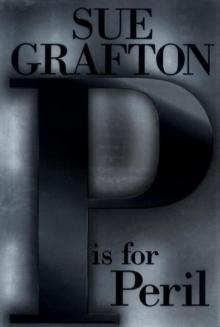 P is for PERIL
P is for PERIL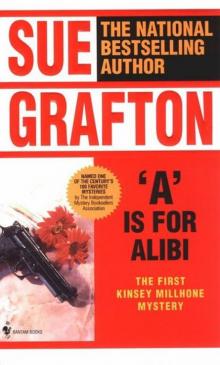 A is for ALIBI
A is for ALIBI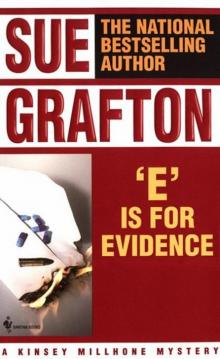 E is for EVIDENCE
E is for EVIDENCE J is for JUDGMENT
J is for JUDGMENT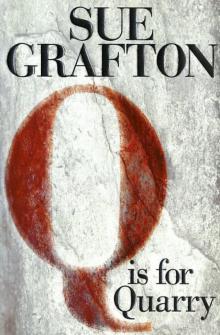 Q is for QUARRY
Q is for QUARRY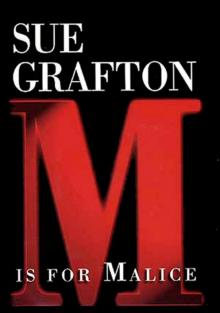 M is for MALICE
M is for MALICE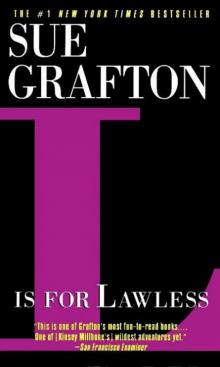 L is for LAWLESS
L is for LAWLESS